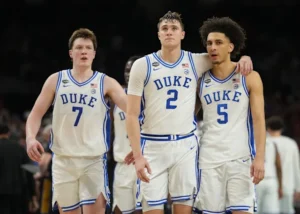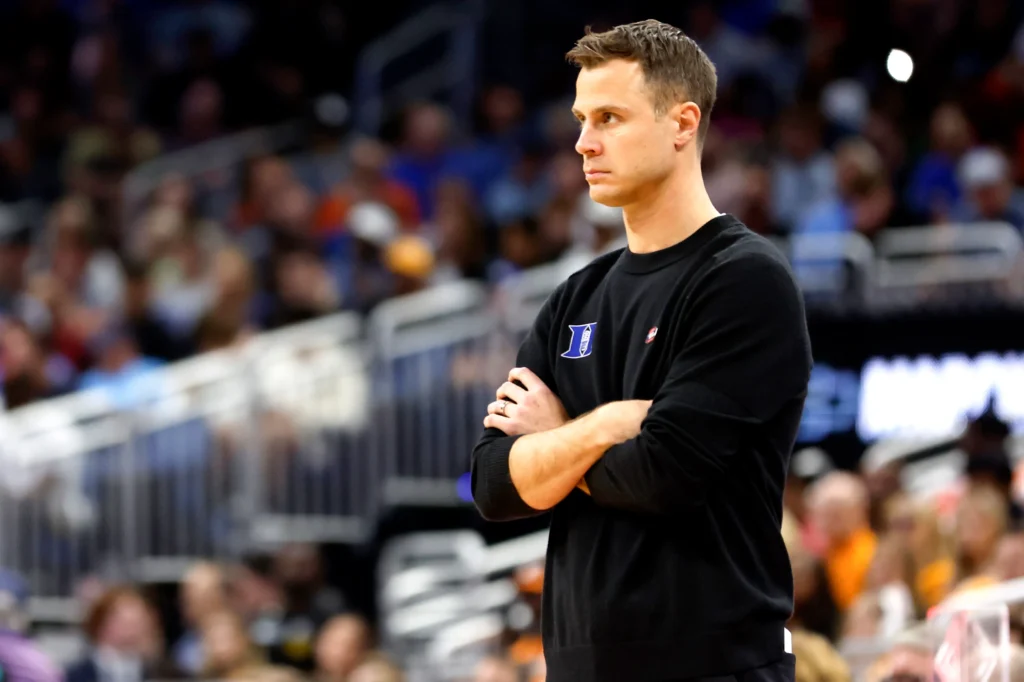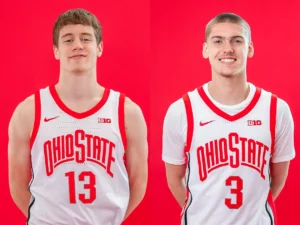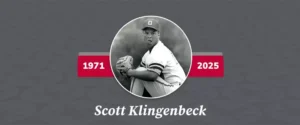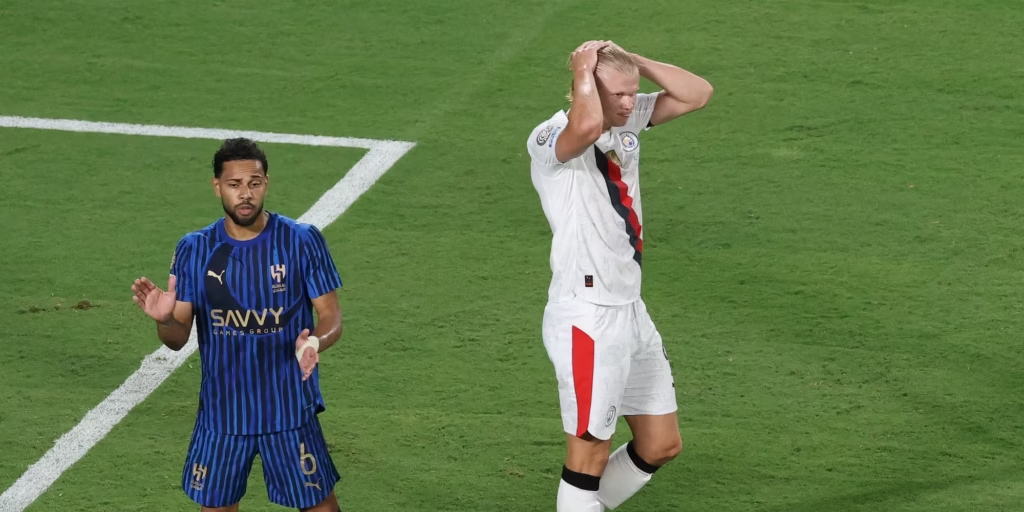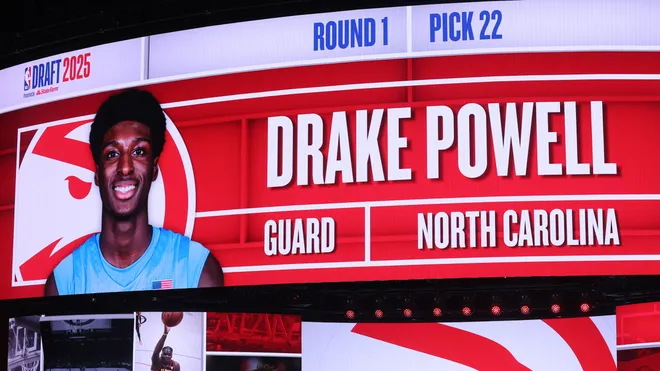
In the fast-paced chaos of the 2025 NBA Draft, the Brooklyn Nets made a quietly impactful move by acquiring Drake Powell from the Atlanta Hawks, who selected the North Carolina wing with the 22nd overall pick before trading him to Brooklyn. While the transaction didn’t garner the front-page headlines of top lottery picks or blockbuster trades, it might end up being one of the most strategically significant moves of the night. In Powell, the Nets secured a high-motor, defensively gifted forward whose game screams “NBA-ready role player” with the upside to grow into something more.
Drake Powell is a 6-foot-6 wing with a 6-foot-11 wingspan, excellent lateral quickness, and a relentless commitment to team defense. During his one season with the North Carolina Tar Heels, Powell made his name as one of the best perimeter defenders in the nation. He averaged 9.7 points, 5.8 rebounds, 2.4 assists, and 1.4 steals per game while shooting 44% from the field and 35% from three-point range. While his scoring output wasn’t eye-popping, he showcased all the intangibles that NBA teams crave—energy, intelligence, anticipation, and the ability to guard multiple positions. For a team like the Nets, who are retooling with an emphasis on culture, development, and versatility, Powell fits the blueprint perfectly.
The Brooklyn Nets are entering a new chapter, transitioning away from the remnants of the failed superstar era that included Kevin Durant, Kyrie Irving, and James Harden. What followed that experiment was a clear message from the organization: it’s time to rebuild through youth, defense, and high-character players. General manager Sean Marks and head coach Jacque Vaughn have emphasized developing a tough-minded identity rooted in unselfishness and resilience. In that light, Powell is more than just a late first-round pick. He is a foundational piece in the type of team Brooklyn is trying to build.
What separates Powell from many other wings in this draft class is his elite defensive profile. He takes pride in locking down opposing scorers, whether they’re speedy guards or physical wings. At North Carolina, he routinely took on the challenge of guarding the other team’s best perimeter player. His footwork, discipline, and ability to contest without fouling made him a nightmare for ball-handlers. He communicates well, rotates quickly, and plays help defense with timing and awareness far beyond his years. The Nets, who have long lacked a true defensive stopper on the wing, have just added someone who relishes that role.
Offensively, Powell is a work in progress but further along than some might realize. While he’s not a primary shot-creator, he moves well without the ball, cuts with purpose, and finishes effectively at the rim. His three-point shot, once considered a weakness, has steadily improved, and his mechanics suggest that he could become a league-average or better shooter with time. He has a high release and confidence in catch-and-shoot situations, particularly from the corners. Powell doesn’t try to do too much, which is rare for young wings. He knows his role, plays within the offense, and rarely forces shots. That kind of self-awareness is valuable in a league full of players looking to prove themselves.
One of Powell’s most underrated qualities is his rebounding ability. For a wing, he is incredibly aggressive on the glass. He boxes out like a big, chases down long rebounds, and has the leaping ability to compete with taller players in traffic. That toughness translates to transition opportunities, where Powell excels as a finisher. He runs the floor hard, fills lanes correctly, and thrives in fast-break situations. With Brooklyn looking to play faster and get easier buckets, Powell’s ability to generate offense through defense and rebounding fits naturally into that philosophy.
Brooklyn also gains a player who’s battle-tested. Playing at North Carolina means performing under the spotlight of one of college basketball’s most intense environments. Powell handled that pressure with poise, maturity, and focus. He wasn’t the leading scorer or the face of the team, but he became its defensive anchor and emotional stabilizer. That kind of experience translates well to the NBA, especially in a city like Brooklyn, where media scrutiny and fan expectations can weigh heavily on young players.
From a personality standpoint, Powell is exactly the type of player the Nets covet. He’s known for his work ethic, humility, and team-first mentality. He’s not looking to dominate the spotlight—he wants to win. Coaches at UNC consistently praised his attitude in practice, his attention to detail in film sessions, and his willingness to take on the toughest assignments without complaint. That mindset aligns perfectly with Brooklyn’s current organizational direction. With a roster full of hungry young players like Cam Thomas, Noah Clowney, and Dariq Whitehead, Powell will blend seamlessly into a locker room focused on growth and development.
In many ways, the acquisition of Powell mirrors some of the most successful under-the-radar moves in recent NBA history. Think of players like Mikal Bridges (now ironically on the Nets), OG Anunoby, or even a young Lu Dort—wings who didn’t enter the league with fanfare but quickly carved out roles because they defended hard, played smart, and competed with intensity. Powell isn’t being asked to be a star right away. Instead, he’s being given the opportunity to develop organically into a high-level role player and maybe more.
The timing is also right for Powell to make an impact. The Nets, while not immediate contenders, are building toward something sustainable. They have draft capital, a flexible cap situation, and a coaching staff that believes in player development. Powell will be given minutes, responsibilities, and the freedom to make mistakes early. That’s an ideal environment for a rookie who brings effort every night and learns quickly. The Nets don’t need him to score 20 points per game. They need him to defend, hustle, make the right reads, and grow into a leader on and off the floor.
His arrival also opens up interesting lineup possibilities. With his defensive versatility, Powell can be slotted into various rotations. He can guard opposing point guards in small-ball sets, play the two or three in standard lineups, or even slide into a small-ball four role against faster teams. His switchability gives Jacque Vaughn the flexibility to experiment, particularly in a league increasingly defined by positionless basketball. Powell may not have the scoring upside of some of his peers, but his ability to influence the game in multiple areas could make him one of the more valuable two-way wings in his draft class.
The fans in Brooklyn may not have been immediately familiar with Powell on draft night, but they’ll soon come to appreciate what he brings. He’s the kind of player who wins games in the margins—drawing charges, getting deflections, closing out hard, and making the extra pass. Those aren’t glamorous plays, but they matter. They add up over the course of a season. In a city that respects hustle, grit, and effort, Powell’s style of play should resonate.
As the Nets look to re-establish themselves as a serious contender in the Eastern Conference, players like Powell will be critical. Every successful team needs glue guys—players who don’t need the ball to impact the game. That’s Powell. He’s a glue guy with upside, someone who might not fill the stat sheet every night but who does the little things that help teams win.
Ultimately, the trade that brought Drake Powell to Brooklyn may not dominate the highlight reels or the post-draft headlines, but it could prove to be a turning point for a franchise trying to reassert its identity. Powell is a winner, a worker, and a competitor. He doesn’t need attention. He needs opportunity. And in Brooklyn, he’ll get it. He’ll be tested, pushed, and coached hard—but if history is any indication, he’ll respond the way he always has: with quiet determination and relentless effort.
As the 2025–26 NBA season approaches, Powell will enter training camp with something to prove—not because he needs validation, but because that’s how he’s wired. He’s not just playing for a contract or a rotation spot. He’s playing to contribute, to lead, and to win. And in Brooklyn, that’s exactly the kind of energy that’s needed. The Nets didn’t just draft a player on draft night. They brought in a tone-setter, a culture-builder, and possibly, a future cornerstone in Drake Powell.
